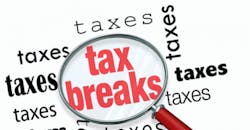What the Largest Tax Overhaul in 30 Years Means for Companies
The impact of the biggest overhaul of the U.S. tax code in three decades will spread far and wide starting next year, highlighted by a cut in the corporate rate to 21% from 35%, fully allowable deductions for capital expenses and lower levies on repatriating overseas profits.
Here’s how the law will most likely affect various industries:
Autos
The industry’s biggest companies, including General Motors Co. and Ford Motor Co., will benefit from the rate cut and the reduction on levies for repatriating overseas profits, according to UBS.
Big auto dealers, like AutoNation Inc., are also poised to do well because they are focused in the U.S. and pay high tax rates.
Industrials
In machinery, trucking is likely to see the biggest impact, according to Jefferies LLC. The corporate rate cut would give U.S. transportation companies of all sizes more money to upgrade their fleets with fuel-efficient vehicles. The bill’s increased deductions for capital spending would add another incentive to buy new 18-wheelers, a potential boon for truck makers like Paccar Inc. and Navistar International Corp.
The same can’t be said for farming and its equipment suppliers like Caterpillar Inc. Farmers are struggling to be profitable at current crop prices, which means the corporate tax cut will have little impact on them. But that could change if prices rise, Jefferies said.
The tax cut could also spur industrial giants to divest businesses that aren’t core to current strategy, Jefferies said. Many conglomerates have maintained divisions because selling them would generate a big tax bill.
The overhaul could be a boon for aircraft suppliers, like Boeing Co. and General Electric Co., because airlines need to upgrade their fleets, too.
Pharmaceuticals
U.S. drugmakers will be one of the biggest beneficiaries of the repatriation portion of the bill. They’ve been sitting on billions of dollars in overseas earnings and can now bring home that cash at a reduced rate. While the tax bill has been promoted by Republicans as a job creator, the reality is that drug companies are more likely to return the money to shareholders, or use it to make acquisitions.
Biotech and pharma companies will get a smaller tax credit for developing drugs for rare diseases. Under current law, they can deduct 50% of the cost of testing drugs for rare or orphan diseases that affect only small numbers of patients. The revised bill cuts that amount to 25%, raising government revenue by $32.5 billion over a decade.
Consumer Products/Retail
Retailers are primed to be big winners from the rate cut because many generate all, or at least an overwhelming majority, of their income in the U.S. and pay some of the highest tax rates of any industry.
Full and immediate deductions on capital expenditures could allow at least one retailer to not owe any federal taxes the next two years. Aaron’s Inc., which leases televisions and refrigerators to consumers at more than 1,700 stores, will be able to use deductions on buying inventory, which are considered capital investments, to wipe out its tax bill in 2018 and 2019, according to Stifel Nicolaus & Co.
Chains and consumer brands also expect the tax bill to boost demand for their goods and services. Many of those companies rely on middle- and low-income shoppers for the bulk of their sales, and changes to individual taxes -- such as doubling the standard deduction -- will increase discretionary income.
Technology
Tech stands to benefit from repatriation. U.S. companies are sitting on $3.1 trillion in overseas earnings, according to an estimate from Goldman Sachs Group Inc. The largest stockpile belongs to Apple Inc. at $252 billion -- 94 percent of its total cash. Microsoft Corp., Cisco Systems Inc., Google parent Alphabet Inc. and Oracle Corp. round out the top five, data compiled by Bloomberg show.
One caveat is that the repatriation provision could generate a large tax bill. In Apple’s case, a 14.5% rate would equate to $36.6 billion in taxes, or about $7 a share, according to Bloomberg Intelligence.
Energy
Oil-and-gas companies will be big winners because they pay the second-highest effective tax rate of any sector, at 37%, according to Bloomberg Intelligence. But a number of oil explorers and equipment providers won’t benefit because their operations are unprofitable.
The industry also benefits from a measure that opens a portion of Alaska’s Arctic National Wildlife Refuge to oil and gas drilling, which could generate $1 billion in revenue over a decade.
The renewable-energy industry avoided taking a big hit by lobbying Republicans to keep a $7,500 electric-vehicle subsidy and a tax credit for wind-power production. But there is concern that the bill’s changes to how tax credits work may disrupt financing of wind and solar projects.
The coal industry notched a victory by getting the corporate alternative minimum tax killed -- a move executives say will reduce bankruptcies.
By Matt Townsend
About the Author
Bloomberg
Licensed content from Bloomberg, copyright 2016.
